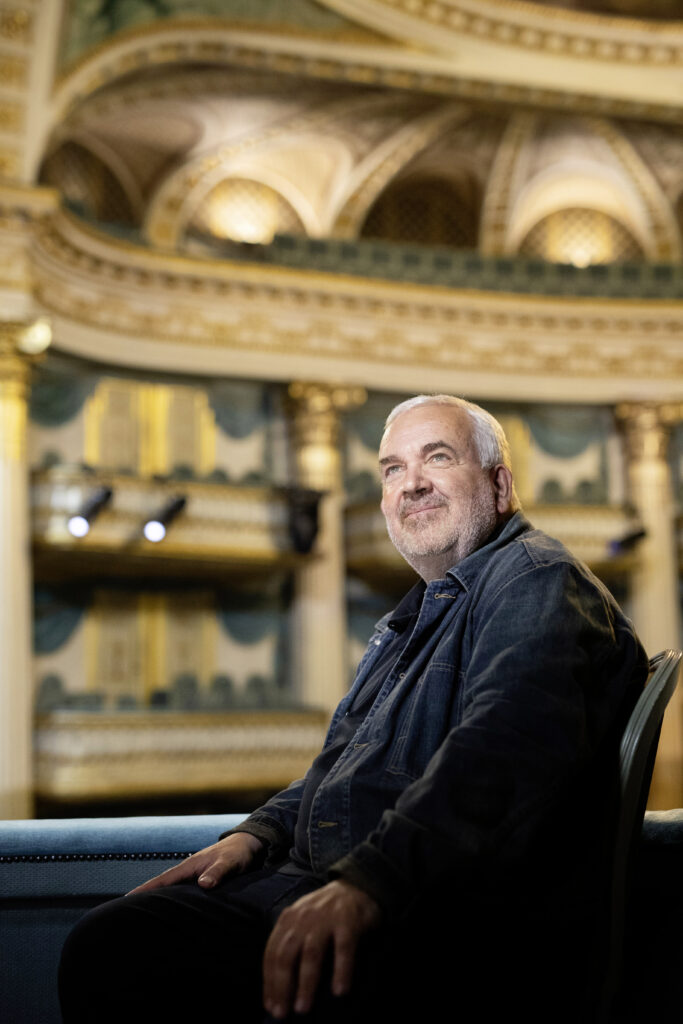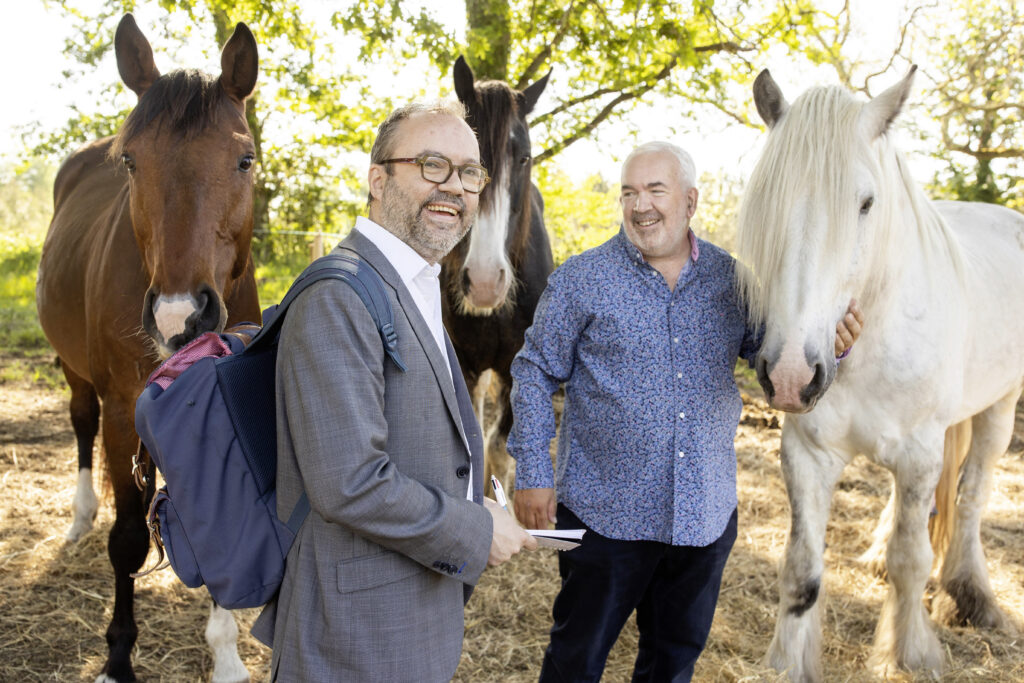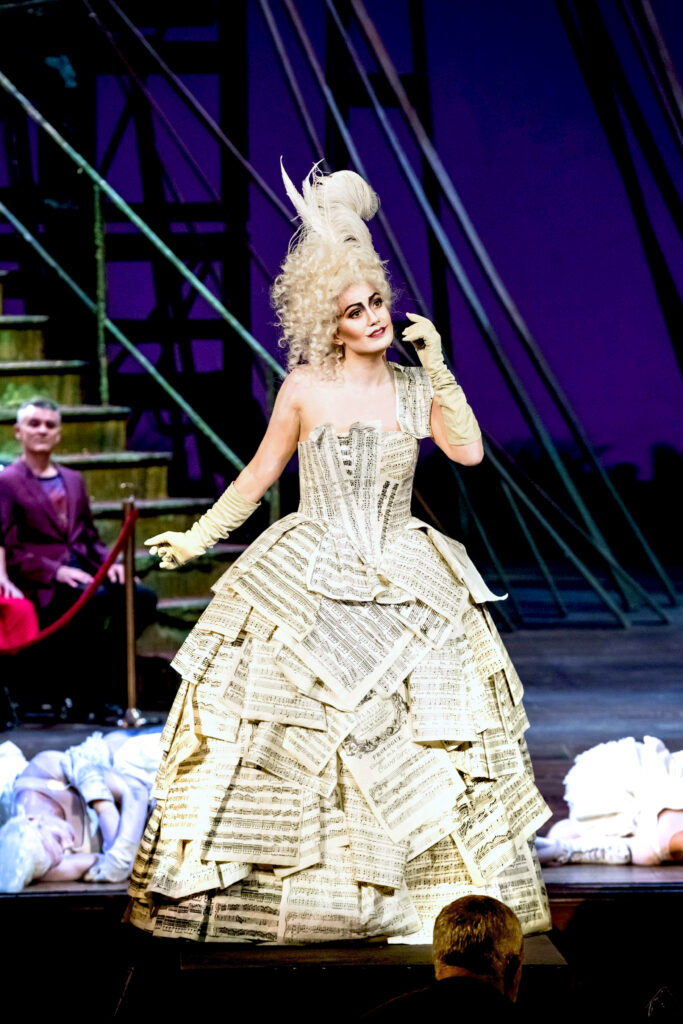You have just finished performing a Mozart trilogy at the Opéra national de Bordeaux. An apotheosis after almost six years at the head of the institution?
It is a beautiful gift that we offer to the public with the three operas which are among the greatest in the repertoire: The Marriage of Figaro, Don Juan and Così fan tutte. Propose the three works whose librettos are signed by Lorenzo da Ponte [poète et librettiste vénitien (1749-1838) NDLR], over three days, is an extremely rare performance. It is a physical ordeal for the orchestra and for certain singers who sometimes play several roles throughout the trilogy. It is also an opportunity for me to say goodbye to this city that I love so much. Admittedly, the Parisian that I am was not immediately welcomed there. But the contact with the public has been extraordinary. Previously, I had never directed an opera house. I am proud to leave this one with finances in balance despite two years of pandemic, a booming patronage and subscriptions on the rise. With, as a final bouquet, these marvelous works of Mozart.
He is the greatest composer?
They are all great! For a long time, I was cataloged in “theatre music”, in the baroque. Industry professionals like to stick labels. Personally, I have chosen my camp: that of eclecticism. I assume it and I observe that I have always been trusted to go in very different directions. The fact remains that Mozart, in the constellation of musical geniuses, is a pinnacle of perfection, intelligence and sensitivity.
In a few days, you resume platy by Jean-Philippe Rameau at the Opéra Garnier in Paris. Is it a good gateway to opera for the general public?
There is none better! It is a perfect musical comedy which immediately takes the spectators on a mythological intrigue, a pastiche of the machine operas of the 17th century.e century. The comic power of the work is accompanied by philosophical reflection, orchestral scintillation and characters that everyone can identify with. The subjects evoked can be transposed into our contemporary torments, a bit like Molière’s plays which remain so current. It is a baroque comedy of very great luxury but which remains accessible.
If the Baroque can entertain, it also leads to a form of asceticism…
Baroque works, in their diversity, each resonate in a unique way. With the sacred music of Bach, for example, we are in something unique in the history of art, all disciplines combined. Believers or not, of whatever religious tradition we are, we are caught up in the supernatural force of a composer who is in communication with the beyond. In two seconds of music, we find ourselves transported by the strength, the fervor, the spirituality of this man. He manages to make the Bible sound, vibrant. When a conductor directs the first choir of the Passion according to Saint John, he can go so far as to make the nails of the crucifixion heard as long as he accentuates them, which some do not dare, moreover. I myself hear the tears of Mary Magdalene, the roars of the crowd… It’s all there, so obviously.
As a teenager, you dreamed of being an actor… or a rider!
I wanted everything at the same time, like many young people. Theater and literature fascinated me. Besides, I really liked the world of horses so much that I wanted to become a professional breeder or rider. Today I own five draft horses, Clydesdales and Shires. I got into music and I discovered my talents later, in this case the bassoon, at the age of 13. I am a “gifted adult”. At first, it’s all about donations, but it’s perseverance that makes the difference. The bassoon is also an excellent observation post on everything that happens in the orchestra pit. When, later, I took up opera, I rediscovered everything: the workings of theater and musical expression. Without forgetting the equestrian art when, for example, I invited Bartabas to come and choreograph the Requiem of Mozart in Salzburg, Austria. Conducting an orchestra is a very tough job: it’s a matter of gift but also of passion, patience, work, emotions… and ego.
This year you are celebrating the fortieth anniversary of your formation, The Musicians of the Louvre. The age of maturity?
A beautiful anniversary rather, which we will celebrate as it should be on October 21 at the Royal Opera of Versailles by offering excerpts from operas by Handel and Gluck, two composers who propelled the career of our musical ensemble. When we started in the 1980s, we were among the first to play period instruments. Using the strings, materials and forces that composers knew in their time is a bit like restoring a façade or a painting: it’s rediscovering the air of yesteryear. Another way to breathe.
You are both French, of Polish Jewish origin by your father, Catholic by your American mother. You also had an evangelical Protestant grandfather. How has this heritage shaped you?
You forget that I also have contact with the Arab world since my mother was a great translator of this literature. The music I present has indeed very different religious roots. I am the fruit of this mixing of cultures. And besides, very often, music and spirituality come into resonance, to the point of becoming one. Even if I remain a goy, I remain very sensitive to what is happening in the Jewish universe. My father, Alexandre, was a renowned pediatrician, one of the founders of neonatology. He would have dreamed of becoming a conductor. My maternal grandmother was a great violinist who unfortunately saw her career cut short after a wrist injury while hiking in the mountains. When I started playing music, she was already an old lady. We had some nice exchanges, very few on the music alas. Enough, however, for me to measure how lucky I was to have her in my life. She is like my spiritual godmother for music.
Was the Catholic religion important to your mother?
My mother went through great trials. She was very religious and my father, although of another faith, willingly supported her and frequently accompanied her to mass. My father’s best friend was none other than Dom Paul Grammont, the abbot of the Benedictine abbey of Bec-Hellouin (Eure), alongside whom he had fought during the Second World War. It was in this abbey that I was baptized. A few years before I was born, my parents lost a child. They told me very little about it, but I know one thing: without the faith and unfailing support of the monks and nuns of Bec-Hellouin, my mother would not have survived this tragedy. Neither did my father. This child rests today near the abbey, with my parents. I sometimes visit their graves. This place has a special charge for me.

Sacred places have also marked your musical career.
Especially when I started. I played in Parisian churches like Saint-Merry, Notre-Dame-du-Travail, Saint-Julien-le-Pauvre, Saint-Étienne-du-Mont with its splendid rood screen. During my travels and my discoveries, I like to let myself be touched by grandiose buildings, such as the Sagrada Familia in Barcelona, or very simple places, such as the small church of Loix, on the Ile de Ré, where I founded the Ré Majeure festival.
You are renowned for your boundless energy. What are the projects that are close to your heart?
There’s no shortage of them: Garnier, Versailles, Théâtre des Champs-Élysées… This summer, with The Musicians of the Louvre, we’ll be going to Israel, to Saint-Jean-d’Acre. I will take the opportunity to make a pilgrimage to a place that I do not yet know: Abu Gosh, west of Jerusalem. The opportunity to visit the Benedictine brothers who are very close to the community of Bec-Hellouin.
>>> Also read on lepelerin.com: Julien and Véronique Ostini: “Preparing an opera, the project of an entire village”
Behind the scenes

At the end of a dirt road is his house, a beautiful old residence. As soon as we arrived with the photojournalist Rodolphe Escher, we were welcomed by the master of the place, Marc Minkowski, who introduced us to his draft horses, his other great passion. Once installed in the living room, he reveals himself pianissimo with his low and calm voice. But the clock beats time: rehearsal time is approaching. No baroque flourishes. With sobriety, it goes to the essential.
His news

Eleven performances of Platée by Jean-Philippe Rameau at the Opéra Garnier in Paris, from June 17 to July 12, 2022. operadeparis.fr ; 08 92 89 90 90.
His bio
October 4, 1962. Born in Paris.
1982. Creates The Musicians of the Louvre, an ensemble on period instruments. Conducts his first opera, Dido and Aeneas, by Henry Purcell.
1986. Started at Les Arts Florissants, the ensemble founded by William Christie in 1979.
1996. Mounted Idomeneo of Mozart at the Opéra Bastille.
2011. Launches the Ré Majeure festival on the Ile de Ré.
2013. Leads “Mozart Week” in Salzburg.
2016. Takes the direction of the National Opera of Bordeaux.
2022. Leaves the Bordeaux National Opera.
Marc Minkowski: “Bach makes the Bible resonant, vibrant” – Le Pèlerin

